
HEART FAILURE REVIEWS
Scope & Guideline
Shaping the Future of Heart Health Through Rigorous Review
Introduction
Aims and Scopes
- Clinical Management of Heart Failure:
The journal emphasizes the importance of clinical management strategies for heart failure, including pharmacological treatments, lifestyle interventions, and the use of advanced therapies such as device management and surgical options. - Innovative Therapeutic Approaches:
Research published in the journal often explores novel therapeutic approaches, such as the use of SGLT2 inhibitors, GLP-1 receptor agonists, and other emerging drugs, highlighting their efficacy and mechanisms in heart failure management. - Diagnosis and Prognosis:
The journal focuses on advancements in diagnostic techniques, including echocardiography, cardiac MRI, and biomarkers, as well as prognostic tools that aid in assessing heart failure severity and outcomes. - Pathophysiology and Mechanisms:
A significant portion of the articles delve into the underlying mechanisms and pathophysiology of heart failure, including molecular, genetic, and inflammatory aspects that contribute to disease progression. - Comorbidities and Multidisciplinary Care:
The journal promotes the understanding of comorbid conditions associated with heart failure, advocating for a multidisciplinary approach to patient care that addresses both cardiac and non-cardiac issues.
Trending and Emerging
- Digital Health and Telemonitoring:
The integration of digital health technologies and telemonitoring for heart failure management is increasingly highlighted, showcasing the potential for improving patient outcomes through remote monitoring and engagement. - Heart Failure with Preserved Ejection Fraction (HFpEF):
Research on HFpEF is gaining traction, with a focus on its unique challenges, therapeutic options, and the development of specific management guidelines, reflecting a better understanding of this complex condition. - Personalized and Precision Medicine:
There is a growing trend towards personalized medicine in heart failure treatment, with an emphasis on tailoring therapies based on genetic, molecular, and phenotypic characteristics of patients. - Innovative Biomarkers and Diagnostic Tools:
The exploration of novel biomarkers and advanced diagnostic tools, such as cardiac imaging techniques and machine learning algorithms, is becoming more prevalent, enhancing the ability to stratify risk and personalize treatment. - Impact of Lifestyle Modifications:
Recent publications increasingly emphasize the significance of lifestyle modifications, including dietary and exercise interventions, as integral components of heart failure management.
Declining or Waning
- Traditional Pharmacological Approaches:
There seems to be a decreasing emphasis on traditional pharmacological treatments such as ACE inhibitors and beta-blockers, as newer therapies like SGLT2 inhibitors gain prominence in heart failure management. - Isolated Studies on Specific Comorbidities:
Research focusing solely on specific comorbidities without integrating them into a broader heart failure management context is becoming less frequent, indicating a shift towards more holistic approaches. - Generalized Risk Factors:
Articles that discuss generalized risk factors for heart failure without specific context or innovative approaches are appearing less often, as the field moves towards more targeted and individualized treatment strategies.
Similar Journals

Cardiac Failure Review
Advancing knowledge in cardiac care.Cardiac Failure Review, published by Radcliffe Cardiology, is a leading open-access journal dedicated to advancing the understanding and management of cardiac failure. With an ISSN of 2057-7540 and an E-ISSN of 2057-7559, this journal has gained significant recognition in the field, achieving a Q1 ranking in Cardiology and Cardiovascular Medicine as of 2023. Its impressive positioning at rank #97 out of 387 in Scopus further highlights its impact, placing it within the top 25th percentile of its category. Since transitioning to open access in 2019, Cardiac Failure Review has become increasingly accessible, ensuring that critical research findings are available to a global audience. The journal's focus spans innovative treatments, emerging technologies, and comprehensive reviews, effectively meeting the needs of researchers, clinicians, and students alike. With a commitment to excellence in cardiovascular medicine, Cardiac Failure Review plays a vital role in disseminating knowledge and fostering discussions that drive the field forward.

Cardiology Research and Practice
Transforming research into practice for better patient outcomes.Cardiology Research and Practice is a leading academic journal dedicated to advancing knowledge in the fields of cardiology and cardiovascular medicine. Published by HINDAWI LTD, this journal has been an inclusive platform for open access research since 2009, facilitating the dissemination of high-quality studies that contribute to the global scientific community. With an impact factor placing it in Q2 of its category in 2023, it underscores its importance in delivering innovative insights and discoveries that shape clinical practices and policies. The journal covers a broad scope of topics including, but not limited to, cardiovascular disease prevention, innovative treatment modalities, and emerging technologies, appealing to researchers, healthcare professionals, and students alike. Located in the United States with its international reach, Cardiology Research and Practice serves as a critical resource for those dedicated to improving patient outcomes and advancing the field of cardiology.
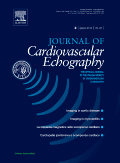
Journal of Cardiovascular Echography
Innovating diagnostics through cutting-edge echography.Journal of Cardiovascular Echography, published by WOLTERS KLUWER MEDKNOW PUBLICATIONS, serves as a premier platform for global researchers, medical professionals, and students dedicated to the ever-evolving fields of cardiology and cardiovascular imaging. With the ISSN 2211-4122 and E-ISSN 2347-193X, this journal provides access to cutting-edge research from 2011 to 2024, offering insights into the latest advancements in echocardiographic techniques and their clinical applications. Despite its current classification in the Q3 quartile within both Cardiology and Cardiovascular Medicine as well as Radiology, Nuclear Medicine, and Imaging, it continues to make meaningful contributions to the academic community, ranking 234th in the Scopus category for Radiology and 278th in Cardiology. The Journal of Cardiovascular Echography is committed to furthering knowledge and fostering collaboration among researchers by sharing critical developments in the field, making it an essential resource for anyone looking to stay abreast of transformational changes in cardiovascular diagnostics.
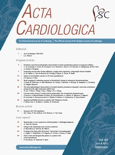
ACTA CARDIOLOGICA
Uniting professionals through groundbreaking cardiac studies.ACTA CARDIOLOGICA is a distinguished journal published by TAYLOR & FRANCIS LTD, focusing on the dynamic fields of Cardiology and Cardiovascular Medicine. Established in 1946, the journal has maintained a significant presence in the academic community, providing a platform for cutting-edge research and clinical studies that aim to address challenges in cardiovascular health. With its Q3 rating in both Cardiology and General Medicine categories, it showcases a robust compilation of articles that reflect the evolving landscape of cardiac care. Although ACTA CARDIOLOGICA is not an Open Access journal, it continues to serve a vital role for researchers, professionals, and students dedicated to advancing knowledge in cardiovascular health. This journal, with an ISSN of 0001-5385 and E-ISSN of 1784-973X, is a critical resource for those looking to stay updated on the latest developments and practices in the specialization, contributing significantly to the field until 2024 and beyond.
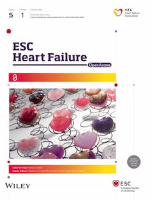
ESC Heart Failure
Advancing heart health through groundbreaking research.ESC Heart Failure is a premier academic journal dedicated to the field of cardiology, specifically focusing on heart failure and its management. Published by WILEY PERIODICALS, INC, this esteemed journal has been an open access publication since 2014, making cutting-edge research readily accessible to a global audience. With its impressive impact factor and recent classification as a Q1 journal in Cardiology and Cardiovascular Medicine for 2023, ESC Heart Failure stands out as a leading resource with a Scopus ranking of #68 out of 387 in its field, placing it in the 82nd percentile. The journal aims to disseminate vital research findings, reviews, and clinical insights that advance the understanding and treatment of heart failure, thereby supporting healthcare professionals, researchers, and students in enhancing patient care. Its commitment to quality and relevance makes ESC Heart Failure an essential publication for anyone involved in cardiovascular medicine.

Arquivos Brasileiros de Cardiologia
Exploring the frontiers of cardiovascular science since 1950.Arquivos Brasileiros de Cardiologia is a leading open-access journal dedicated to advancing the field of cardiology and cardiovascular medicine. Established in 1950 and published by the ARQUIVOS BRASILEIROS CARDIOLOGIA, this Brazilian journal plays a crucial role in disseminating high-quality research that addresses both emerging and established topics in cardiovascular science. With an impressive history and a commitment to open access since 1997, it provides researchers, healthcare professionals, and students with free and readily available content that significantly contributes to the understanding and management of cardiovascular diseases. The journal is indexed in Scopus and holds a Q3 ranking in the category of Cardiology and Cardiovascular Medicine, demonstrating its relevance and participation within the global research community. Researchers can submit their work and access a wealth of information that spans a variety of subfields, reflecting the journal’s dedication to fostering innovation and collaboration within cardiology. With a mailing address at Avenida Marechal Câmara, 160-330 Centro, Rio de Janeiro, RJ 20,020-907, Brazil, the journal continues to serve as a vital platform for scholarly communication and knowledge exchange in the cardiovascular realm.
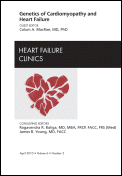
Heart Failure Clinics
Navigating the Evolving Landscape of Heart Failure ResearchHeart Failure Clinics, published by Elsevier Science Inc, stands at the forefront of research and clinical practice in the rapidly evolving field of cardiology and cardiovascular medicine. With an ISSN of 1551-7136, this prestigious journal has established a reputation for high-quality peer-reviewed articles, offering critical insights into heart failure management, innovative therapies, and health care strategies. Ranked in the Q2 quartile for cardiology and cardiovascular medicine and recognized in the Q1 quartile for miscellaneous medicine as of 2023, it reflects a significant impact on both clinical and academic communities, holding a commendable position in the 73rd percentile of its category according to Scopus rankings. Since its inception in 2005, this journal has continuously been a vital resource for researchers, healthcare professionals, and students aiming to enhance their understanding of heart failure. Although it does not offer full open access options, the depth and relevance of its content make it indispensable for anyone engaged in heart health research and practice. Located in the heart of New York, at 230 Park Ave, STE 800, it aims to foster knowledge exchange and promote advancements in cardiovascular care until its converged years in 2024.

Netherlands Heart Journal
Pioneering Research in Cardiology and Cardiovascular MedicineNetherlands Heart Journal is a premier academic publication dedicated to advancing knowledge in the field of cardiology and cardiovascular medicine. Published by BOHN STAFLEU VAN LOGHUM BV, this journal has established itself as a critical platform for researchers, professionals, and students seeking to explore groundbreaking findings and innovative practices in cardiovascular health. With an ISSN of 1568-5888 and E-ISSN 1876-6250, the journal boasts a respectable Q2 ranking in the Cardiology and Cardiovascular Medicine category, placing it in the top half of its field according to the 2023 quartiles. The Scopus ranking places it 130th out of 387 in the relevant category, indicating a commendable percentile rank of 66th, which attests to its influence and quality of published research. Spanning from 2005 to 2024, the journal endeavors to include a diverse array of topics, encompassing clinical practice, technological innovations, and public health considerations related to cardiovascular diseases. Researchers and practitioners are encouraged to engage with the journal's robust content, contributing to and benefiting from the collaborative effort to enhance cardiovascular health worldwide.
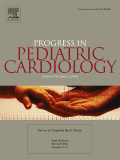
PROGRESS IN PEDIATRIC CARDIOLOGY
Pioneering Discoveries in Heart Health for ChildrenPROGRESS IN PEDIATRIC CARDIOLOGY is a notable journal dedicated to advancing research and knowledge in the fields of pediatric cardiology and cardiovascular health in children. Published by Elsevier Ireland Ltd, this journal serves as a vital resource for clinicians, researchers, and healthcare professionals who engage with the complexities of heart diseases affecting pediatric populations. With ISSN 1058-9813 for print and 1558-1519 for online issues, it operates from Ireland and reflects a commitment to disseminating high-quality, peer-reviewed research since its inception in 1992. The journal is ranked in the Q3 category in both cardiology and pediatrics, indicating its relevance in the academic community, despite recent performance metrics showing room for growth within the competitive landscape. Researchers and practitioners can expect to find cutting-edge findings and clinical studies that aim to improve outcomes in pediatric cardiology. While it does not offer Open Access, the breadth of research covers various critical aspects, contributing significantly to the field's ongoing development.
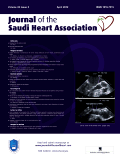
Journal of the Saudi Heart Association
Championing Open Access to Cardiovascular ResearchThe Journal of the Saudi Heart Association is a prominent scholarly publication dedicated to advancing knowledge in the fields of cardiology and cardiovascular medicine. Published by DIGITAL COMMONS BEPRESS, this open-access journal has been serving the global community since 2009, providing a vital platform for researchers, practitioners, and students interested in the latest developments in heart health and disease management. With an ISSN of 1016-7315 and a growing repository of knowledge alongside an E-ISSN of 2212-5043, the journal showcases an array of peer-reviewed articles that contribute to the understanding of cardiovascular conditions. Although categorized in the Q4 quartile for 2023, it remains committed to offering valuable insights, particularly within the constraints of the 29th percentile rank specified by Scopus. As the journal converges towards 2024, it continues to foster collaboration, innovation, and inquiry within the Saudi Arabian and international medical communities.